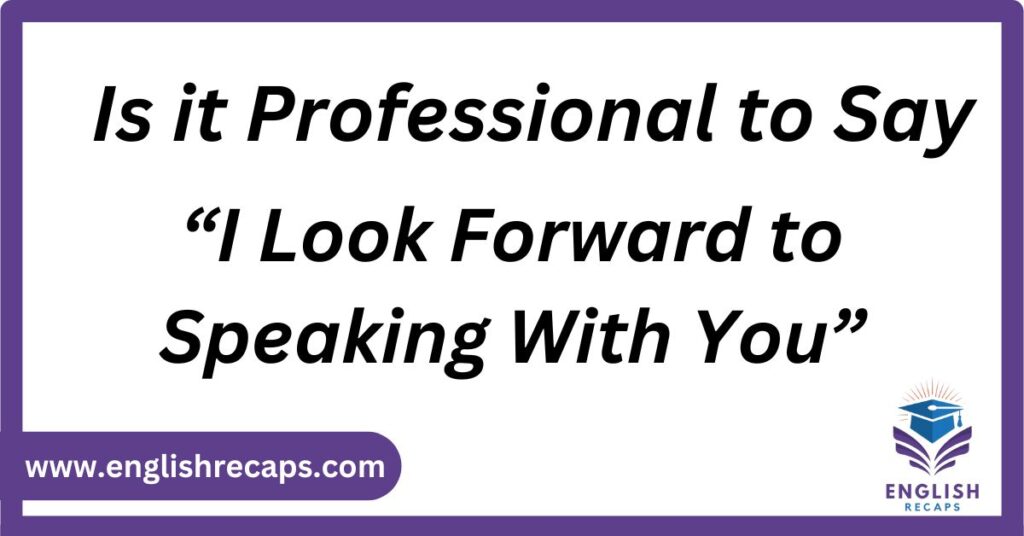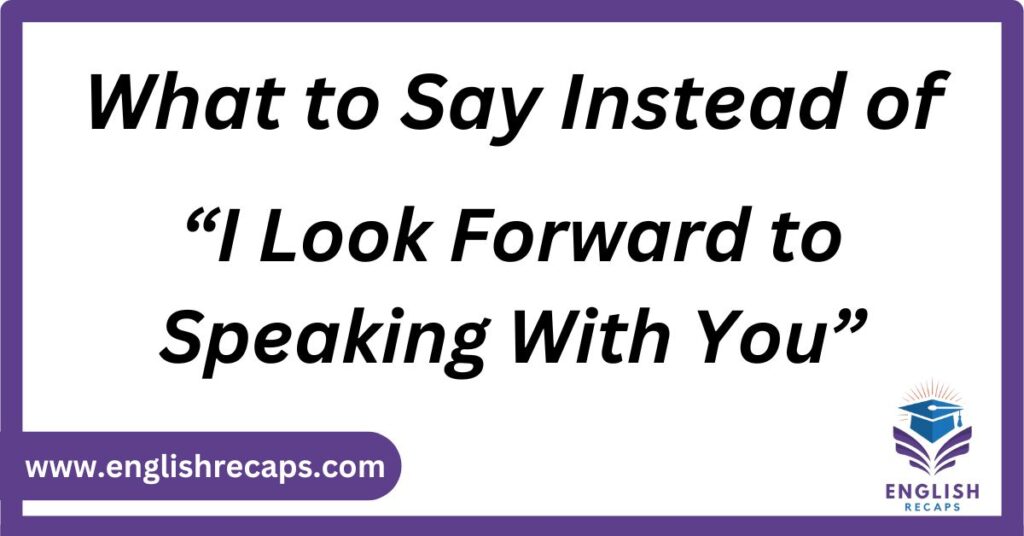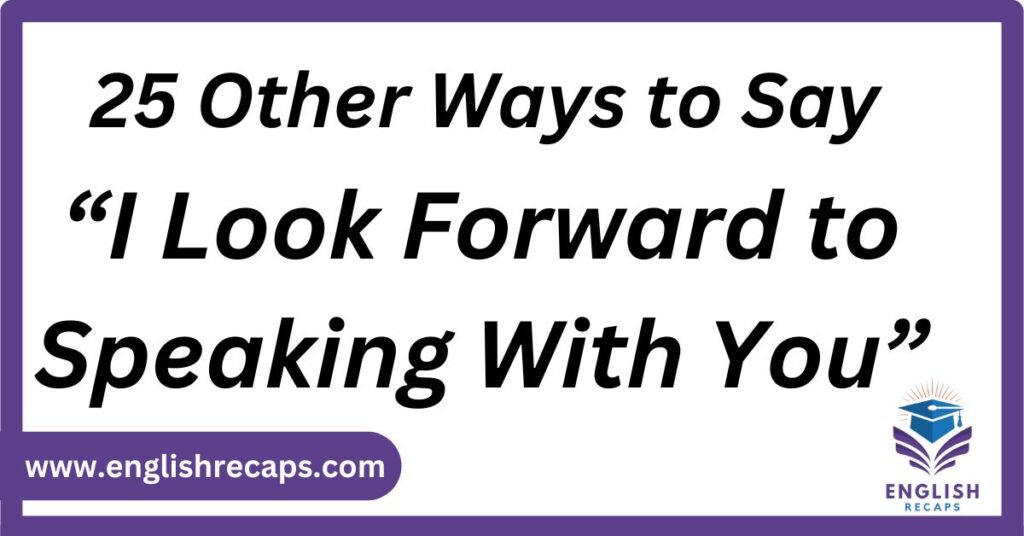In the realm of professional communication, expressing anticipation for future interactions is an art form. While the phrase “I look forward to speaking with you” has long been a staple, it’s time to breathe new life into our correspondence.
This article will explore 25 alternative expressions that convey enthusiasm and professionalism, helping you stand out in a sea of emails and messages.
The world of Yoholist offers an intriguing blend of modern lifestyle practices and ancient wisdom, designed to elevate your life in meaningful ways. From boosting productivity to nurturing your well-being, the exclusive Yoholist practices cater to those who seek more out of their daily routine. Whether you’re a seasoned wellness enthusiast or new to this journey, there’s something here that can add value to your life.
Is it Professional to Say: i look forward to speaking with you

Saying “I look forward to speaking with you” is indeed a professional and widely accepted phrase in business communication. It conveys a polite sense of anticipation and respect for the upcoming interaction. This expression is versatile, suitable for various contexts such as emails, letters, or verbal communication.
It strikes a balance between formality and friendliness, making it appropriate for most professional situations. However, while it’s a safe and reliable choice, it’s also commonly used, which might make your message less memorable.
Depending on the situation and your relationship with the recipient, you might consider using one of the alternative expressions mentioned earlier to add a personal touch or to stand out in your communication. Ultimately, the professionalism lies not just in the phrase itself, but in how it fits the overall tone and context of your message.
What to Say Instead of “i look forward to speaking with you”

- I’m eager to delve into our upcoming conversation.
- I’m counting down to our enlightening discussion.
- I’m excited to unpack our ideas together.
- I’m keen to engage in our upcoming dialogue.
- I’m looking forward to unraveling insights with you.
- I’m thrilled about our upcoming exchange.
- I’m eagerly anticipating our conversation.
- I can’t wait to explore this topic further with you.
- I’m looking forward to our upcoming tête-à-tête.
- I’m excited to dive into our discussion.
- I’m anticipating our exchange with great interest.
- I’m eager to bounce ideas off each other.
- I’m looking forward to our insightful discussion.
- I’m excited to unpack the details with you.
- I’m keen to delve into our conversation.
- I’m eagerly awaiting our discussion.
- I’m anticipating our chat with excitement.
- I’m looking forward to our productive exchange.
- I’m eager to engage in our forthcoming dialogue.
- I’m excited to delve into the nuances of our topic.
- I’m looking forward to our meeting of minds.
- I’m eager to explore the possibilities with you.
- I’m anticipating a fruitful discussion.
- I’m excited to brainstorm ideas with you.
- I’m looking forward to our enlightening exchange.
You may wish to learn another related post: 20 Other Ways to Say “Safe Travels”
1. “I’m eager to delve into our upcoming conversation.”
This phrase suggests a readiness to explore topics in depth, perfect for discussions that require thorough analysis.
Example scenario:
In an email to a potential research collaborator, Dr. Emily Chen writes:
“Dear Dr. Patel,
Your recent paper on quantum computing applications in climate modeling caught my attention. I’m eager to delve into our upcoming conversation next week. I believe your innovative approach could significantly enhance our current atmospheric prediction models.
Best regards, Dr. Emily Chen”
2. “I’m counting down to our enlightening discussion.”
This expression adds a touch of excitement and anticipation to your message.
Example scenario:
In a follow-up email after a conference, Mark Thompson writes:
“Hello Sarah,
It was a pleasure meeting you at the TechInnovate Conference. I’m counting down to our enlightening discussion on AI ethics next Thursday. Your insights on the panel were truly thought-provoking.
Warm regards, Mark”
3. “I’m excited to unpack our ideas together.”
This phrase suggests a collaborative approach and shows enthusiasm for diving into details.
Example scenario:
In a team message about an upcoming brainstorming session, Olivia writes:
“Hey team,
I hope you’ve all had a chance to jot down some initial thoughts for our new product launch. I’m excited to unpack our ideas together in tomorrow’s meeting. Let’s bring our creative A-game!
Cheers, Olivia”
4. “I’m keen to engage in our upcoming dialogue.”
This alternative adds a touch of formality while still expressing enthusiasm.
Example scenario:
In a professional networking context, Carlos writes:
“Dear Ms. Rodriguez,
Thank you for accepting my invitation to discuss sustainable urban planning. I’m keen to engage in our upcoming dialogue and learn from your extensive experience in green architecture.
Best regards, Carlos”
5. “I’m looking forward to unraveling insights with you.”
This phrase suggests that the conversation will be enlightening and potentially solve complex issues.
Example scenario:
In an email to a mentor, Lisa writes:
“Hello Dr. Yamamoto,
I hope this email finds you well. I’ve been grappling with some challenging concepts in my research, and I’m looking forward to unraveling insights with you during our meeting next week. Your guidance has always been invaluable.
Gratefully, Lisa”
6. “I’m thrilled about our upcoming exchange.”
This expression conveys a high level of excitement about the future conversation.
Example scenario:
In a message to a potential collaborator, Mark writes:
“Hi Olivia,
I’ve just finished reading your latest paper on urban sustainability, and I’m thrilled about our upcoming exchange. Your innovative approaches align perfectly with our city’s goals.
Best, Mark”
7. “I’m eagerly anticipating our conversation.”
This phrase combines eagerness with a formal tone, making it suitable for professional settings.
Example scenario:
In a follow-up email after a networking event, Rachel writes:
“Dear Mr. Johnson,
It was a pleasure meeting you at the Tech Innovators Conference last week. I’m eagerly anticipating our conversation scheduled for next Thursday to discuss potential synergies between our companies.
Warm regards, Rachel”
8. “I can’t wait to explore this topic further with you.”
This expression shows enthusiasm and a desire to dig deeper into a subject.
Example scenario:
In a message to a fellow researcher, David writes:
“Hello Dr. Patel,
Your recent findings on climate change adaptation strategies are fascinating. I can’t wait to explore this topic further with you during our video call next week. I believe your insights could significantly impact our current project.
Best wishes, David”
9. “I’m looking forward to our upcoming tête-à-tête.”
This phrase adds a touch of sophistication and intimacy to your message.
Example scenario:
In a note to a long-time business associate, Emma writes:
“Dear Robert,
I hope this message finds you well. I’m looking forward to our upcoming tête-à-tête over lunch next Friday. It’s been too long since we’ve had a chance to catch up properly.
Warmly, Emma”
10. “I’m excited to dive into our discussion.”
This alternative conveys enthusiasm and readiness to engage deeply in the conversation.
Example scenario:
In an email to a potential client, Tyler writes:
“Hello Ms. Garcia,
Thank you for expressing interest in our services. I’m excited to dive into our discussion next week and show you how our solutions can address your specific needs.
Best regards, Tyler”
11. “I’m anticipating our exchange with great interest.”
This phrase combines anticipation with a formal tone, suitable for professional correspondence.
Example scenario:
In a message to a guest speaker, Professor Adams writes:
“Dear Dr. Lee,
On behalf of the entire department, I’m anticipating our exchange with great interest at next month’s symposium. Your work on quantum computing has been groundbreaking, and we’re honored to host you.
Sincerely, Professor Adams”
12. “I’m eager to bounce ideas off each other.”
This expression suggests a collaborative and creative approach to the upcoming conversation.
Example scenario:
In a team chat about an upcoming project, Jasmine writes:
“Hey everyone,
I’ve been brainstorming some concepts for our new app design. I’m eager to bounce ideas off each other in our meeting tomorrow. Let’s bring our creative hats!
Cheers, Jasmine”
13. “I’m looking forward to our insightful discussion.”
This alternative expresses anticipation while also setting an expectation for a productive conversation.
Example scenario:
In an email to a mentor, Alex writes:
“Dear Professor Wilson,
Thank you for agreeing to meet with me next week. I’m looking forward to our insightful discussion about my thesis proposal. Your guidance has always been invaluable to my academic journey.
Gratefully, Alex”
14. “I’m excited to unpack the details with you.”
This phrase suggests a thorough and detailed approach to the upcoming conversation.
Example scenario:
In a message to a client about a complex project, Sophia writes:
“Hello Mr. Tanaka,
I’ve reviewed the initial project brief, and I’m excited to unpack the details with you in our meeting next Tuesday. I believe we can create something truly exceptional for your brand.
Best regards, Sophia”
15. “I’m keen to delve into our conversation.”
This expression combines enthusiasm with a readiness to explore topics in depth.
Example scenario:
In an email to a potential research partner, Dr. Martinez writes:
“Dear Dr. Kim,
Your recent publication on renewable energy storage solutions caught my attention. I’m keen to delve into our conversation next week and explore potential areas for collaboration.
Best wishes, Dr. Martinez”
16. “I’m eagerly awaiting our discussion.”
This phrase conveys a sense of anticipation and enthusiasm for the upcoming exchange.
Example scenario:
In a follow-up email after a job interview, Liam writes:
“Dear Ms. Thompson,
Thank you again for the opportunity to interview for the Marketing Manager position. I’m eagerly awaiting our discussion next Friday to further explore how my skills align with your team’s needs.
Warm regards, Liam”
17. “I’m anticipating our chat with excitement.”
This alternative combines anticipation with a more casual tone, suitable for less formal situations.
Example scenario:
In a message to a mentor before an informal catch-up, Zoe writes:
“Hi Sarah,
I hope you’re doing well! I’m anticipating our chat with excitement this weekend. I can’t wait to update you on my recent projects and get your always-insightful feedback.
Talk to you soon, Zoe”
You may wish to learn another related post: 80 Other Ways to Say “Coming Soon”
18. “I’m looking forward to our productive exchange.”
This phrase sets an expectation for a fruitful and efficient conversation.
Example scenario:
In an email to a project partner, Daniel writes:
“Hello Jennifer,
I’ve reviewed the project timeline and budget projections. I’m looking forward to our productive exchange tomorrow to finalize the details and kick off the implementation phase.
Best regards, Daniel”
19. “I’m eager to engage in our forthcoming dialogue.”
This expression combines formality with a sense of anticipation, suitable for professional settings.
Example scenario:
In a message to a potential investor, Maria writes:
“Dear Mr. Nakamura,
Thank you for your interest in our startup. I’m eager to engage in our forthcoming dialogue next week to discuss our innovative approach to sustainable packaging and the market potential it represents.
Warm regards, Maria”
20. “I’m excited to delve into the nuances of our topic.”
This phrase suggests a deep, detailed exploration of the subject matter.
Example scenario:
In an email to a fellow academic, Professor Johnson writes:
“Dear Dr. Alvarez,
Your recent paper on the socioeconomic impacts of AI in the workforce was fascinating. I’m excited to delve into the nuances of our topic during our video conference next month. I believe your insights could significantly contribute to our ongoing research project.
Best wishes, Professor Johnson”
21. “I’m looking forward to our meeting of minds.”
This expression suggests a high-level, intellectual exchange of ideas.
Example scenario:
In a message to a potential collaborator, Dr. Samantha Lee writes:
“Dear Professor Chen,
I’ve been following your groundbreaking work in neuroscience, and I’m looking forward to our meeting of minds next week. I believe the intersection of our research areas could lead to some truly innovative discoveries.
Warm regards, Dr. Samantha Lee”
22. “I’m eager to explore the possibilities with you.”
This phrase conveys enthusiasm and openness to new ideas or opportunities.
Example scenario:
In an email to a potential business partner, Alex writes:
“Hello Ms. Patel,
Thank you for reaching out about a possible collaboration. I’m eager to explore the possibilities with you during our call next Tuesday. I believe our companies’ complementary strengths could create some exciting synergies in the market.
Best regards, Alex”
23. “I’m anticipating a fruitful discussion.”
This expression sets a positive tone and expectation for the upcoming conversation.
Example scenario:
In a follow-up email after a preliminary meeting, Laura writes:
“Dear Mr. Rodriguez,
Thank you for your time last week. I’m anticipating a fruitful discussion in our next meeting to dive deeper into the project requirements and how our team can best meet your needs.
Warm regards, Laura”
24. “I’m excited to brainstorm ideas with you.”
This phrase suggests a collaborative and creative approach to the upcoming conversation.
Example scenario:
In a team message about an upcoming product development meeting, Tom writes:
“Hey team,
I hope you’ve all had a chance to review the market research data. I’m excited to brainstorm ideas with you in tomorrow’s session. Let’s think outside the box and see what innovative solutions we can come up with!
Cheers, Tom”
25. “I’m looking forward to our enlightening exchange.”
This expression combines anticipation with an expectation of gaining valuable insights.
Example scenario:
In an email to a guest lecturer, Professor Adams writes:
“Dear Dr. Nguyen,
On behalf of the entire Economics department, I’m looking forward to our enlightening exchange during your visit next month. Your unique perspective on emerging markets in Southeast Asia promises to be invaluable for our students and faculty alike.
Sincerely, Professor Adams”
Conclusion
In the realm of professional communication, the ability to express anticipation for future interactions with finesse is a valuable skill. By expanding your repertoire beyond the standard “I look forward to speaking with you,” you can inject freshness and personality into your correspondence, making your messages more engaging and memorable.
These 25 alternatives offer a range of tones and styles to suit various contexts, from formal business correspondence to more casual professional interactions.
As you incorporate these phrases into your communications, consider the relationship you have with the recipient and the context of your message. A more formal expression might be appropriate for a high-stakes business meeting, while a casual phrase could work better for a catch-up with a long-time colleague.
By thoughtfully selecting your words, you can convey your genuine enthusiasm for upcoming conversations, setting the stage for engaging, productive, and meaningful exchanges. So go ahead, mix it up, and watch as your professional communications take on new life and energy.
FAQ’s
How do I say “I look forward to speaking with you professionally”?
To say “I look forward to speaking with you” professionally, try “I’m eager to discuss this matter further with you” or “I anticipate our upcoming conversation with great interest.” These phrases convey enthusiasm while maintaining a polite, business-like tone.
What to say instead of looking forward to speaking with you?
Instead of “looking forward to speaking with you,” consider alternatives like “I’m excited to explore this topic together” or “I’m keen to hear your thoughts in our upcoming chat.” These options add variety to your communication while still expressing positive anticipation.
Is it correct to say “looking forward to speaking with you”?
Saying “looking forward to speaking with you” is grammatically correct and professionally acceptable. However, for a more polished tone, you might say, “I anticipate our upcoming discussion with enthusiasm.”


